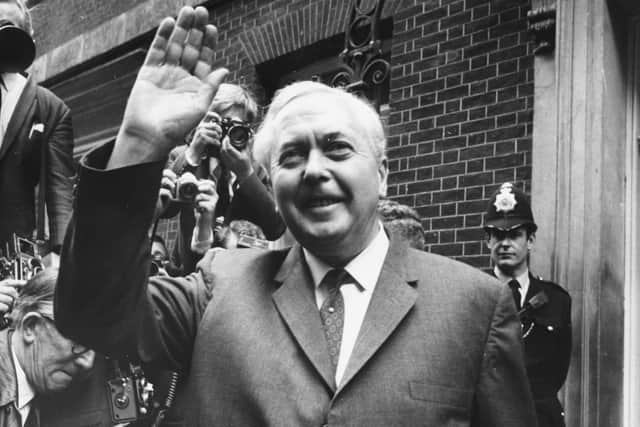Accent shaming of Angela Rayner and Northerners is classless – Rob Potts


Ms Rayner may have overcome significant social barriers to ascend to the role of Deputy Leader of the Opposition but, to some at least, her strong Stockport accent and use of non-Standard English mean that she cannot possibly be fit to occupy a position of such prominence.
Advertisement
Hide AdAdvertisement
Hide AdThis snobbery reminds us how prevalent such attitudes still are in sections of society but also resonate with a debate that rages periodically in the world of education.


There was consternation amongst elements of the teaching fraternity last year when it was reported that the the principal of Ark All Saints academy in south-east London had banned the use of slang, along with ‘fillers’ such as ‘like’ and ‘erm’ in her school.
The news caused a predictable schism between educators, with some bemoaning the way that the language of our education system discriminates against children from disadvantaged backgrounds, while others applauded the school’s insistence that their students should learn to ‘speak properly.’
The use of language to differentiate between the haves and the have nots is no recent phenomenon of course.
Advertisement
Hide AdAdvertisement
Hide AdFor over 300 years after the Norman Conquest, the ruling elite set themselves apart from the hoi polloi through their use of French as the language of power.


These roots were later evident in the development of Standard English as the glue to hold together an (often foreign-born) elite and through the emergence of Received Pronunciation (aka Queen’s English) as the de facto accent of the powerful during the rapid expansion of the public school system in the 19th century.
In his best-selling book The Shortest History of England, the historian James Hawes describes the language favoured by politicians, academia, the media and those in power today as being “basically French,” whilst the rest of the populace (including most of us in the north) tend to favour a more unadorned form of English that has more in common with traditional Anglo Saxon.
Even when Standard English is employed, there is still a degree of snobbery directed at those of us who speak with regional accents. Research by Queen Mary University of London in 2019 found that people over the age of 40 were more likely to judge a job candidate as being “less employable” if they spoke with a regional “working class accent.”
Advertisement
Hide AdAdvertisement
Hide AdThe soft Yorkshire burr of Huddersfield’s Harold Wilson remains anomalous amongst English Prime Ministers (almost all of whom have favoured Received Pronunciation) and even Cambridge-educated Andy Burnham might find that his accent limits his appeal in the South of England should he ever bid to trade Manchester for Westminster.
So where does that leave us as educators?
The debate is hardly a new one. Back in 1921, the Newbolt Report into the teaching of English in England labelled Standard English as a distinct language from that practised by the majority of the population and suggested that “children who speak a dialect should become bilingual, speaking Standard English too”.
Putting aside the innate snobbery in Sir Henry Newbolt’s assertions, what should our approach be 100 years later?
Should we rail against a system that unfairly discriminates against children from working class or ethnic minority backgrounds, as well as those with regional dialects?
Advertisement
Hide AdAdvertisement
Hide AdOr should we accept these parameters and do our best to enable our pupils to ‘play the game’ by these rules?
In an increasingly multicultural society and with technology (and particularly social media) altering our use of language in a manner predicted by George Orwell almost 80 years ago, there’s a strong argument that the presence of a ‘standard form’ of English has never been more important.
But it’s also essential that we appreciate the distinction between dialect (the words and grammar that we use) and accent (the way that we sound).
Dialectal terms, when used in the right settings, provide our language with a richness and diversity that we should celebrate.
Advertisement
Hide AdAdvertisement
Hide AdSimilarly, our accents are an embodiment of our identity that should not be suppressed; when studies indicate that certain regional accents are associated with a lack of intelligence, we should challenge these prejudices rather than accept them.
However, as teachers – and particularly those of us who serve disadvantaged communities – we have a moral responsibility to equip our children for the world we actually live in rather than the one we might prefer to occupy.
For that reason, I’ll continue to encourage my students to be proud of their roots and to be robust in the face of prejudice, but I’ll also ensure that when the situation demands it they can use Standard English confidently and effectively.
Rob Potts works at Parklands Primary School in Seacroft and is the author of The Caring Teacher – How to make a positive difference in the classroom (John Catt Educational Ltd).
Advertisement
Hide AdAdvertisement
Hide AdSupport The Yorkshire Post and become a subscriber today. Your subscription will help us to continue to bring quality news to the people of Yorkshire. In return, you’ll see fewer ads on site, get free access to our app, receive exclusive members-only offers and access to all premium content and columns. Click here to subscribe.
Comment Guidelines
National World encourages reader discussion on our stories. User feedback, insights and back-and-forth exchanges add a rich layer of context to reporting. Please review our Community Guidelines before commenting.